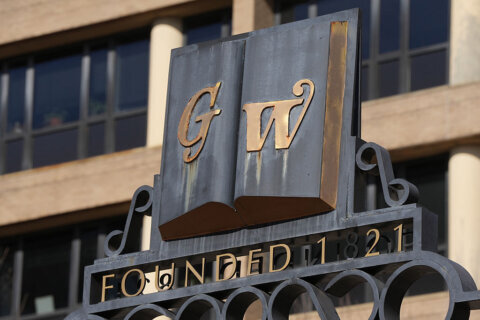The D.C. Council is set to vote Tuesday on a major coronavirus relief package that extends Mayor Muriel Bowser’s authority to declare a health emergency through mid-June and imposes a citywide rent freeze, among other measures.
Details of a draft version of the bill were unveiled Monday morning by Council Chair Phil Mendelson during a news conference with the mayor. Mendelson said the council would make final tweaks to the bill and vote on it Tuesday during a “virtual session.”
The legislation comes as Bower said her administration has directed District government agencies to freeze hiring and salaries in order to cut $600 million from the current fiscal year budget — the current estimate of the loss of revenue to the city from the coronavirus pandemic.
What’s in the bill
Extends the mayor’s authority to declare a health emergency through mid-June. Currently, Bowser’s emergency order — which has closed schools, nonessential businesses and limited restaurants to carryout and delivery only — runs through April 27.
Citywide rent freeze. Covering all units, even those that aren’t normally rent-controlled. The provision blocks any rent increases during the health emergency.
Mortgage relief. If an individual or a business can show that they have reduced income related to COVID-19, mortgage companies have to offer a 90-day deferral, under the bill.
Provides $25 million in grants to hospitals to prepare for the “medical surge.” Last week, Bowser and D.C. Health Director Dr. LaQuandra Nesbitt unveiled models that showed the peak in the number of serious COVID-19 cases requiring hospitalization peaking in late June or early July.
Authorizes up to $500 million in borrowing. The bill authorizes up to $500 million in short-term borrowing by the city as requested by the District’s chief financial officer, Jeff DeWitt. While there is expected to be a “substantial reduction” in money coming into the city’s coffers from reduced sales tax from business, the District remains in a good financial position, Mendelson said.
“We have the money,” Mendelson said. “It’s just a matter of whether we have the cash flow at the right time.”
It’s the first time in half a decade that the city has contemplated having to do short-term borrowing, Mendelson said.
Expands sick leave. The bill expands sick leave as part of the federal CARES Act. That includes a provision requiring businesses with between 50 and 500 employees to provide up to two weeks “safe and sick leave” to their employees.
Aims to reduce jail population. D.C. doesn’t have authority over the federal Bureau of Prisons, but District lawmakers can change sentencing rules. The council’s bill expands credits for good behavior and provides for more inmates to be released on “compassionate” grounds.
Waives community service requirement for high school seniors. The bill waives a requirement that high school seniors complete 100 hours of community service in order to graduate.
‘Consensus’ bill
“This bill … is a consensus document,” Mendelson said, adding that not all council members nor the mayor agree with every provision in the final draft.
“This is a time when we need to be working together and as much as possible be on the same page. So the bill reflects that,” Mendelson said.
- Sign up for news alerts from WTOP
- U.S. ‘wasted’ months before preparing for virus pandemic
- FACT CHECK: Trump pitches drug not approved for coronavirus
- Grocery workers are key during the virus. And they’re afraid
- UK Prime Minister Boris Johnson hospitalized with virus
- Coronavirus test results in D.C., Maryland and Virginia
- Coronavirus FAQ: What you need to know
About a half a dozen proposals that were in earlier versions of the bill were removed over the weekend as lawmakers worked up a draft.
“We were looking at the different proposals with an eye toward their costs, the need related to the emergency, and whether there were possible unintended consequences,” Mendelson said.
Among the proposals that were axed were two proposals aiming to help undocumented immigrants.
One provision would have provided unemployment benefits process for undocumented workers, which was estimated to cost $33 million, and another created a microgrant program for residents who don’t qualify for unemployment insurance, who are primarily undocumented, which was estimated to cost $42 million.
Mendelson said the council will look at other ways to help undocumented D.C. residents.
“There are other opportunities for us to address this, even though I recognize that the need is urgent and that days are critical to some families, weeks certainly are more problematic,” he said.
Bowser: ‘Tough choices’ ahead
Bowser said the District’s freeze on hiring, salary increases and travel is necessary to help slim down the budget for the current fiscal year — which ends in September — by $607 million.
That’s the total amount expected to be lost in revenue this year. The loss in revenue comes from sales tax losses from shuttered businesses and reduced income tax from out-of-work D.C. residents, said DeWitt.
“Just as residents and businesses are making tough choices, the District will make tough choices,” Bowser said.
The total loss in expected revenue is greater than the entire budget for the entire D.C. Fire and EMS department and about half of the budget for D.C. Public Schools, Bowser said.
The $607 million cut would return the District’s budget to about 2017 levels, Bowser said.
“And we were doing fantastic, wonderful transformational things in our city. And we’re going to continue to do wonderful transformational things in our city,” Bowser said. “But there will be less money and there’s more uncertainty about how fast our revenues come back. So everybody should just keep that in mind. ”
Going forward, Mendelson said he expects “leaner” budgets for the next few years.
“If folks are looking for additional programs, that’s a hurdle,” Mendelson said. “I’m not saying that that’s an absolute ‘No’ … But it’s really hard to think of where we’re going to find funding for additional programs.”








